Key takeaways:
- Home automation enhances convenience, energy efficiency, and security, creating a seamless living environment.
- Simple energy-saving practices, like using smart devices and LED lights, can lead to significant reductions in utility bills.
- Participating in energy efficiency workshops provides valuable insights into energy audits, behavior modification, and renewable energy options.
- Future goals include enhancing home automation for energy conservation and exploring renewable energy sources like solar panels.
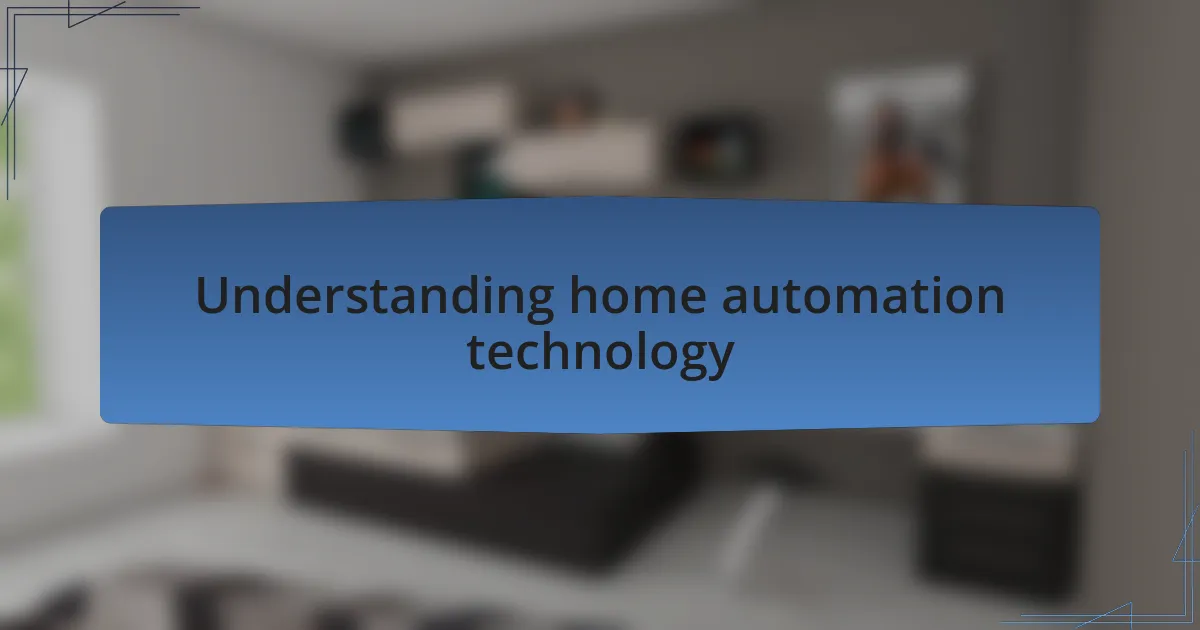
Understanding home automation technology
Home automation technology is all about connecting devices in your home to create a seamless, smart living environment. I remember the excitement I felt the first time I controlled my lights with just my voice. It was a small moment, but it made me realize how much convenience and comfort technology could bring into our daily routines.
Have you ever thought about how much energy we can save with smart devices? When I attended an energy efficiency workshop, I learned how automation can optimize energy use. For example, smart thermostats adjust the temperature based on our habits, which not only keeps us comfortable but also reduces energy bills. It’s fascinating to see how technology can assist our lifestyles while being eco-friendly.
As I explored more about home automation, I was struck by the potential for increased security. Imagine being able to monitor your home in real time from your smartphone. It made me feel empowered, knowing that I could keep an eye on things, even when I was miles away. Isn’t that a comforting thought? The combination of convenience, efficiency, and security truly illustrates the transformative power of home automation technology.
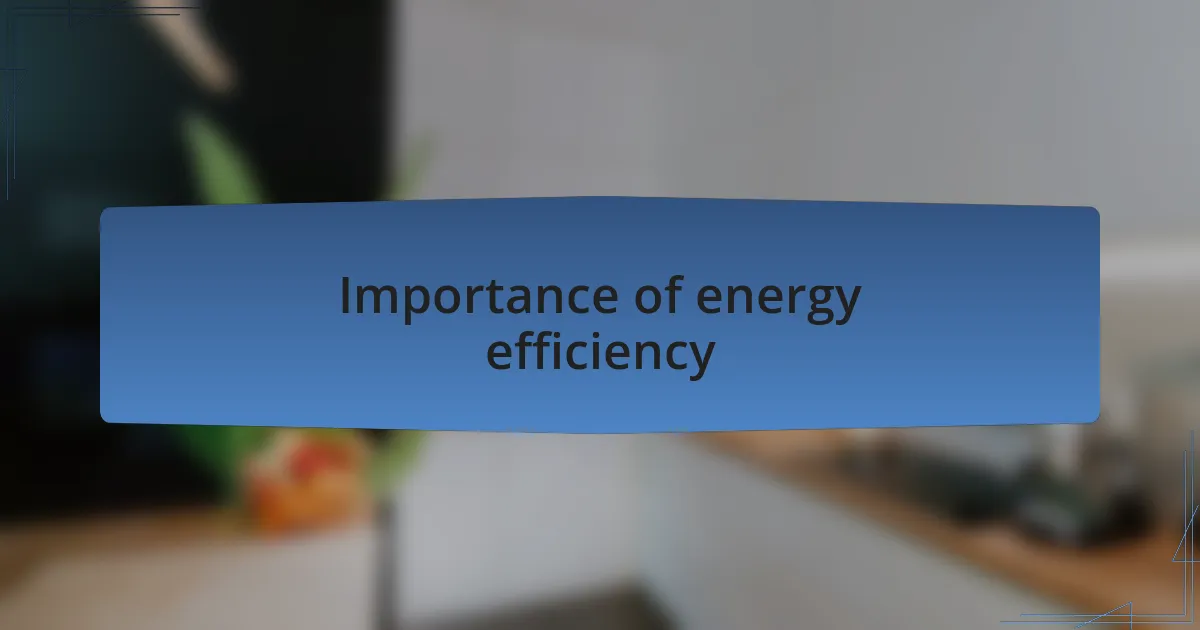
Importance of energy efficiency
Energy efficiency is crucial for both our wallets and the environment. When I revamped my home’s energy use, I was surprised to see how much I could save on utility bills without sacrificing comfort. Just think about it: by making small adjustments, like switching to LED lights or using energy-efficient appliances, we contribute to a significant reduction in energy consumption. Isn’t it rewarding to feel that you’re doing your part to help the planet?
I’ve personally witnessed the impact of being energy-efficient, especially when my family adopted energy-saving practices after attending a workshop. We started using smart plugs to turn off devices that were draining power while not in use. I can still recall the look on my partner’s face when we compared our energy bills and realized the savings added up. Isn’t it empowering to take control of energy use right at home?
Moreover, embracing energy efficiency fosters a sense of responsibility towards future generations. When I consider the world my children will inherit, I feel a deep motivation to make sustainable choices. By prioritizing energy efficiency, we’re not only enhancing our lives today but also safeguarding their tomorrow. How can we not strive for a better, more sustainable future?
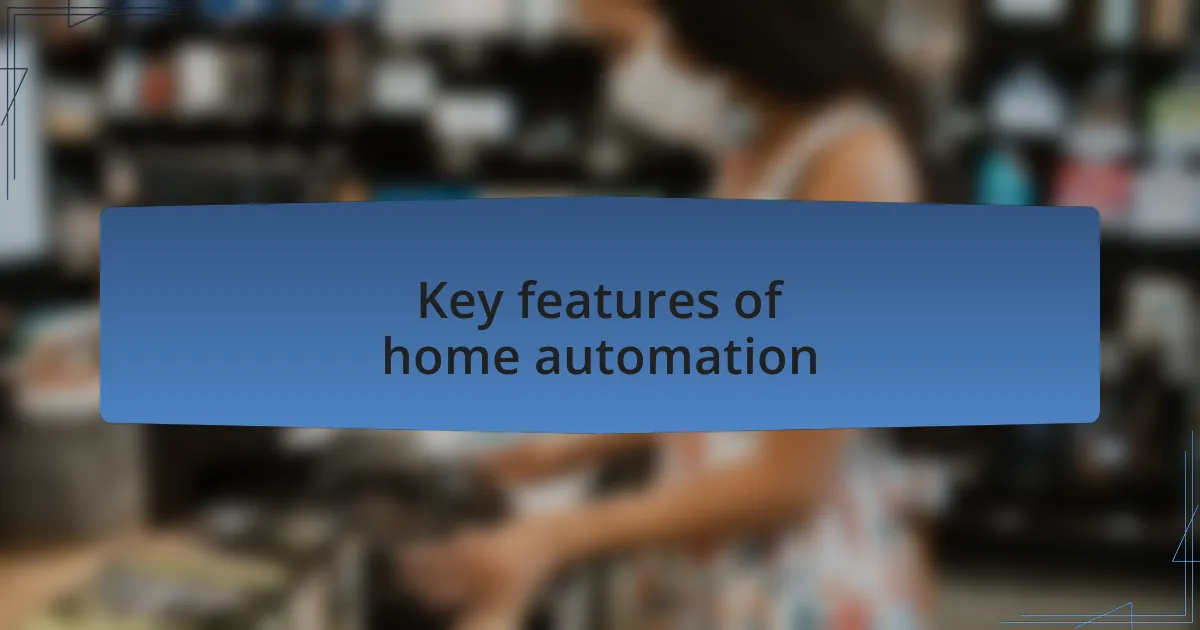
Key features of home automation
Home automation technology brings together several key features that enhance both convenience and efficiency in our daily lives. One feature I find particularly fascinating is the ability to remotely control various devices through a centralized app. I remember the first time I adjusted my home’s thermostat from my phone while stuck in traffic; it felt like living in the future. Isn’t it delightful to think that with just a few taps on your screen, you can create a comfortable environment before you even step through the door?
Another important aspect of home automation is the integration of smart sensors, which monitor everything from temperature to light levels. I once installed a smart light system that adjusted its brightness based on the time of day. The effect was almost magical; my living room transformed from a bright, energizing space in the morning to a cozy, relaxing area in the evening. Have you ever experienced such a seamless transition in your home?
Moreover, energy management is a standout feature of home automation that directly ties into our energy efficiency goals. I remember using an energy monitoring device that helped me track which appliances were consuming the most power. By identifying and adjusting my usage patterns, I not only reduced my energy bills but also felt a profound sense of achievement. Isn’t it empowering to gain insight into your home’s energy consumption and take actionable steps toward improvement?
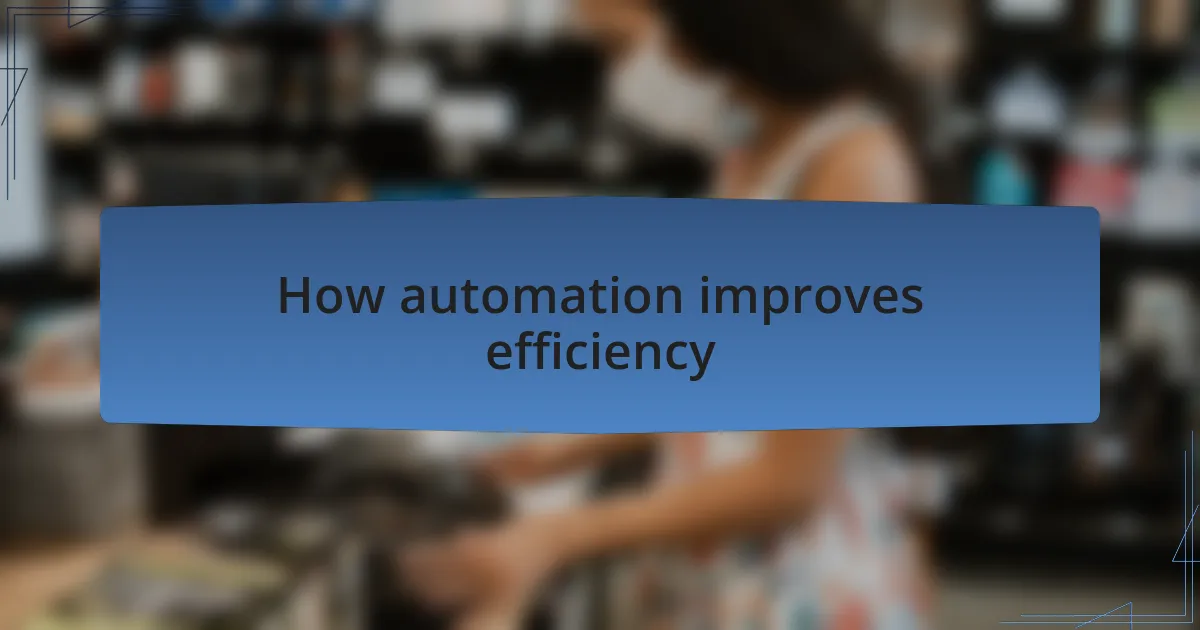
How automation improves efficiency
Automation significantly boosts efficiency by allowing devices to work in harmony, reducing the time and effort needed to manage them. I recall walking into my kitchen one morning when my coffee maker started brewing automatically as my smart lights gradually turned on. That morning ritual consumed less energy and provided me with a perfectly timed cup of coffee—efficient and blissful. Have you ever felt the delightful surprise of waking up to a fully prepared home?
Another way automation enhances efficiency is through scheduled routines that adapt to our lifestyles. For instance, I programmed my smart thermostat to lower the temperature when I leave for work and raise it before I return home. This seemingly simple adjustment not only ensures comfort but also significantly reduces unnecessary energy consumption throughout the day. Isn’t it remarkable how small changes can lead to both comfort and savings?
Integrating automation with energy-efficient appliances creates a synergy that maximizes performance. Once, I installed a smart washer that optimizes its cycles based on load size and fabric type. Every time I use it, I feel a sense of relief that I’m washing my clothes while conserving water and energy. Doesn’t it feel good to know that technology can support a more sustainable lifestyle while simplifying our chores?
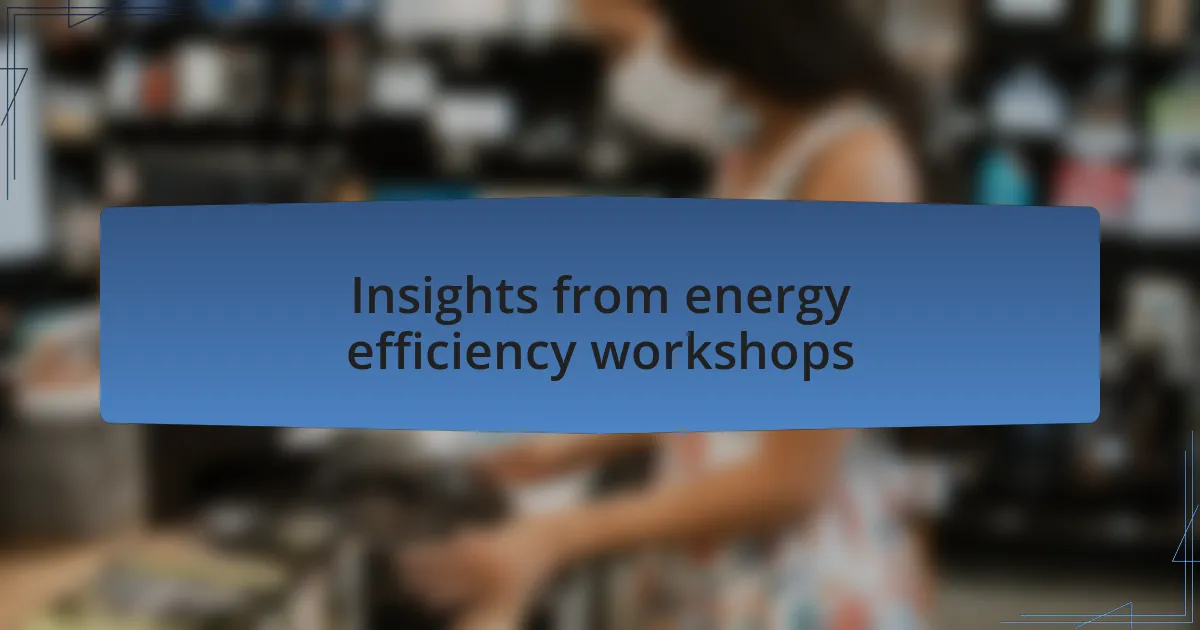
Insights from energy efficiency workshops
Participating in energy efficiency workshops has been an eye-opener for me. I still remember the moment when an expert explained the significance of energy audits. It’s incredible how understanding where and how energy is lost can lead to immediate and impactful changes. Have you ever thought about how much energy might be slipping through the cracks in your home?
One insightful takeaway was the emphasis on behavior modification in energy use. I learned that simple habits, like switching off lights in unused rooms or unplugging devices, contribute significantly to energy savings. At home, I made it a point to involve my family in this initiative. It not only reduced our energy bill but also sparked conversations about sustainability. Don’t you find that discussions around energy efficiency can change habits for the better?
Another highlight was discovering the power of renewable energy options, like solar panels. I was initially hesitant, but after seeing real-life examples of savings and environmental impact, I reconsidered. The thought of generating my own power felt exhilarating, like taking control of my energy future. Have you contemplated how embracing renewable energy solutions could reshape your home’s efficiency and your family’s carbon footprint?
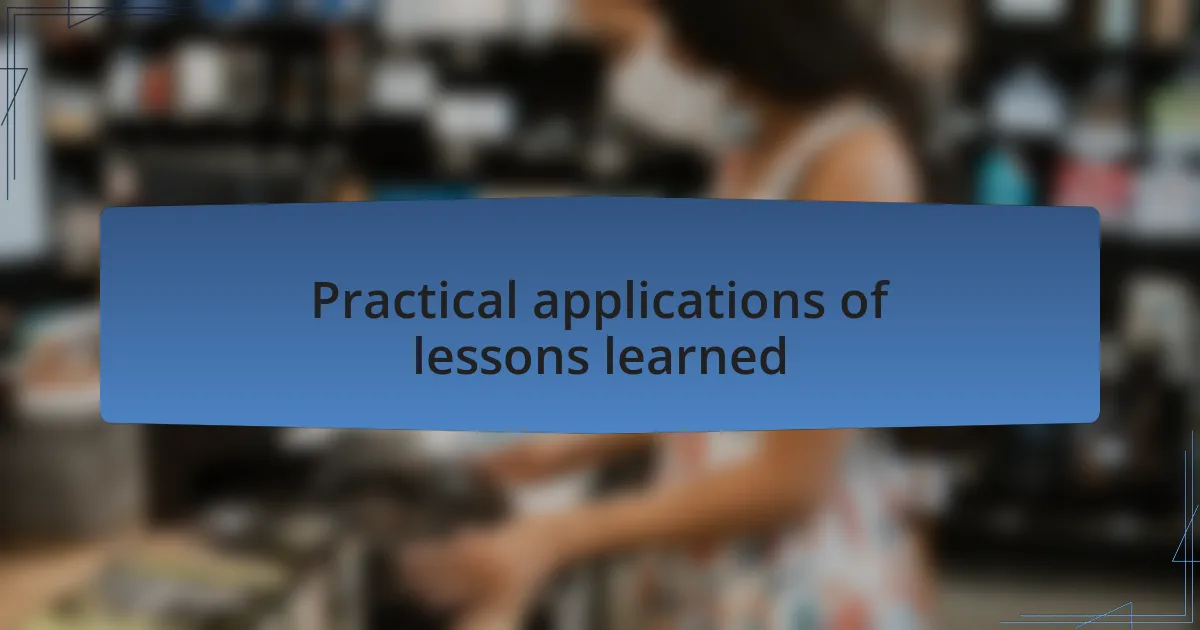
Practical applications of lessons learned
One of the most practical applications I discovered was implementing smart home technology to optimize energy usage. For example, after attending a workshop, I invested in smart thermostats that learn our family’s routine. The difference has been remarkable—I’ve noticed a reduction in our heating costs while maintaining a cozy environment. Have you thought about how a simple adjustment like this could enhance your home’s energy efficiency?
Another lesson I found valuable was the importance of insulation and sealing. I vividly recall the workshop demonstration that showed how small gaps around windows and doors could lead to significant air leaks. After sealing those gaps in my own home, I felt the difference—my living space became more comfortable, and our heating system didn’t have to work as hard. Isn’t it surprising how such a simple fix can lead to both comfort and savings?
Lastly, I learned about the advantage of using energy-efficient appliances. I was hesitant to replace my older models because of the cost. However, after seeing the long-term savings demonstrated in the workshop, I made the leap. Now, it brings me joy every month as I see those savings reflected in our energy bill. Have you considered how upgrading appliances can not only save money but also contribute to a healthier planet?
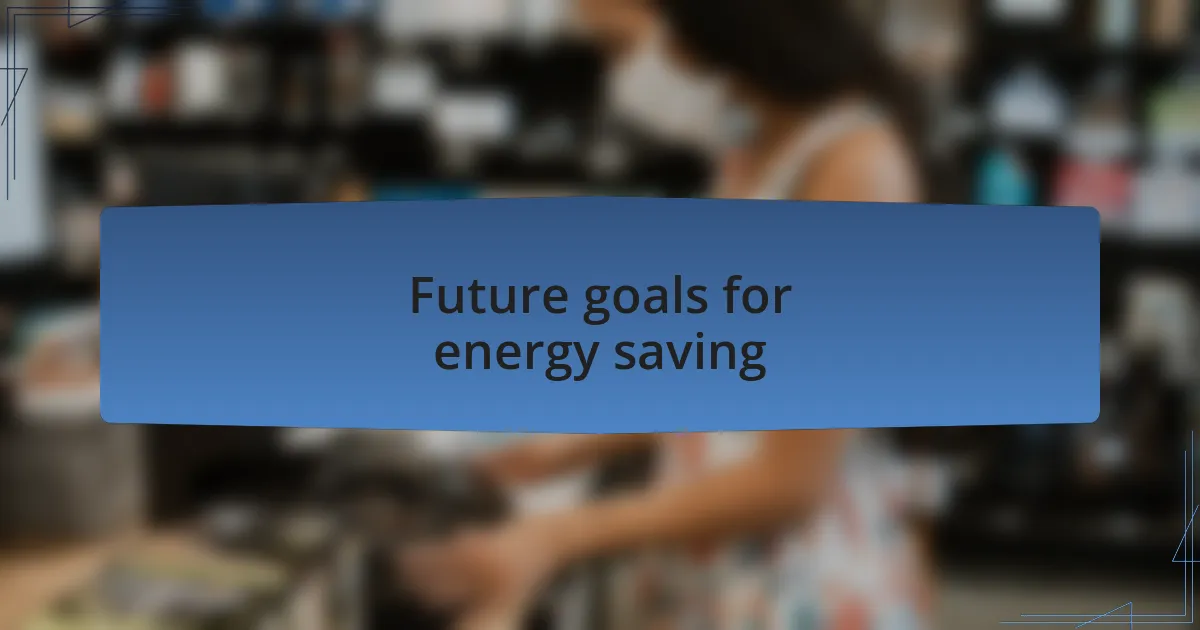
Future goals for energy saving
As I look toward the future, one goal I am passionate about is enhancing our home automation systems to focus even more on energy conservation. I envision a more integrated network where smart devices communicate seamlessly, allowing for real-time adjustments based on energy consumption patterns. Imagine a home that can alert you when energy use peaks and adjust settings accordingly—how much could that save over time?
Another important future goal I reflect on is the potential for renewable energy sources in my household. I’ve developed a keen interest in solar panels after seeing their success stories at the workshops. The idea of harnessing sunlight to power my home not only excites me but also aligns with my long-term vision of reducing my carbon footprint. Have you considered how investing in renewable energy could reshape your energy bills and contribute to a sustainable future?
Lastly, I am committed to staying informed about emerging technologies that can drive energy efficiency. I often find myself researching advancements like energy storage solutions and smart grids. Knowing what’s coming next fuels my motivation to adapt and be proactive about energy saving. Isn’t it inspiring to think about how innovation can lead us to a smarter, greener future?